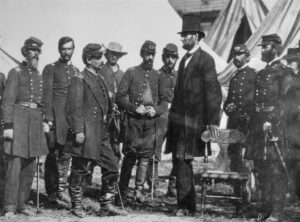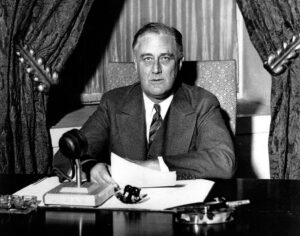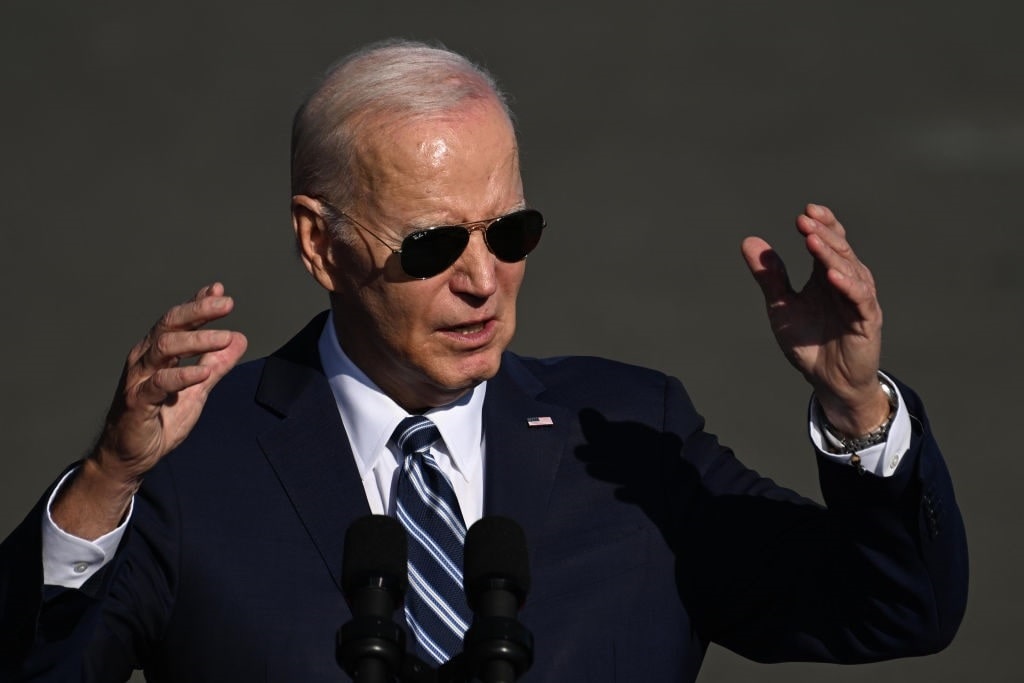There are few things more unnerving for a president seeking re-election than the outbreak of war. A parade of chief executives — from James Madison to Joe Biden — has been forced into the most gut-wrenching decisions a president must make: those certain to cost lives in one form or another amid the fog of war — and a presidential campaign. And while Biden has yet to commit to an expanded American presence on the ground in Ukraine, Israel, or elsewhere in the Middle East, his unambiguous alignment with the Jewish state may well cost him support on the hard left, where the documented atrocities of Hamas have done little to quell support for the terrorist group. His similarly unequivocal support for Ukraine has raised the hackles of battle-weary ordinary Americans wary of taking sides in a grinding war of attrition halfway across the world.
Indeed, Biden is presiding over a season of upheaval and war across the globe — after Donald Trump soothed the savage beast for four years, during which Russian President Vladimir Putin was kept in his box, North Korea was kept at bay, and Israel was kept relatively tranquil. Trump tied up our chief adversary — many would say enemy — China with trade negotiations. Headlines about the tinderbox known as the Middle East were not about war but peace — in the form of the historic Abraham Accords aligning Israel with four moderate Arab countries. In sum, comparisons on the state of the world under the 45th and 46th presidents, viewed through the lens of war and peace, will not help Biden’s cause. In fact, he still has not recovered from his abrupt withdrawal from Afghanistan in the summer of 2021, and it will be seen as more Biden’s perceived weakness than mere coincidence that Putin began massing his troops along the Ukrainian border as soon as the Democrat replaced Trump in the Oval Office.
With the future of the Ukrainian and Israeli wars fraught with both peril and uncertainty, Biden can only hope for a repeat of past instances when effective wartime or quasi-wartime leadership had a positive impact on a president’s electoral prospects. However, such instances are the exception, not the rule.
Presidents and War
James Madison declared war on Britain in June 1812, just five months before facing the voters for a second term. After a failed invasion of Canada, then controlled by the British, Madison was narrowly re-elected, winning by less than three points after capturing the 1808 election by a whopping 32 points. Two years later, in 1814, the Brits would set fire to the White House.

Abraham Lincoln (Getty Images)
In 1864, Abraham Lincoln presided over the most devastating of all conflicts, a civil war that resulted in some one million deaths on and off the battlefield, and yet with the war still raging, he was victorious in the 1864 election by the same margin — ten points — he achieved in the similarly balkanized political climate of 1860.
Woodrow Wilson ran for a second term in 1916 on the promise that he would keep the United States out of the conflict raging in Europe. But once he won re-election, we entered World War I anyway, which almost certainly would have led to Wilson’s defeat in 1920. But he pulled out after being incapacitated by a major stroke, and the Democrats’ successor nominee, James Cox, was steamrolled in a 26-point landslide by Warren Harding, leading to 12 uninterrupted years of Republican control of the White House.
When Franklin D. Roosevelt was forced into World War II by the Japanese invasion of Pearl Harbor in 1941, he was both popular and entrenched, one year past the third of his four presidential victories. And when he finally acceded to the desperate pleas of British Prime Minister Winston Churchill and entered the European war in 1944, FDR was in declining health, months away from death, but still won a fourth landslide victory.
President Harry S. Truman ordered American ground forces to Korea in 1950 and did not stick around to experience the voters’ wrath for the unpopular war, pulling out of the race in 1952 in favor of Adlai Stevenson, who was overwhelmed by Dwight Eisenhower.
The Vietnam War began under the administration of John F. Kennedy, who had unveiled a plan for steady withdrawal from Southeast Asia before his assassination. His successor, Lyndon B. Johnson, went in the opposite direction, escalating the American presence to more than 500,000 troops, and paid a steep price for what later turned into the first defeat in American military history, withdrawing from the 1968 race and dying four years later, a beaten man.
George H.W. Bush actually peaked in popularity in the aftermath of the 1991 Gulf War, soaring to an unheard of 91% approval following an overwhelming military victory, before a precipitous fall leading to a decisive defeat at the hands of Bill Clinton — and Ross Perot — in 1992.

Franklin D. Roosevelt (Photo by Universal History Archive/Getty Images)
George W. Bush drew high marks for his response to 9/11. But he later engaged in the disastrous Iraq War, was barely re-elected in 2004, and, like Wilson, Truman, and Johnson before him, would likely have lost badly had he been up for re-election in 2008. Instead, the GOP nominated John McCain, who carried the weight of Bush 43’s rock-bottom approval and fell victim to the phenomenon known as Barack Obama.
Though FDR stands alone among presidents in benefiting rather than suffering politically during wartime, it is at least theoretically possible that Biden could increase his standing during this Israeli war, as he has attempted to do with his visit to Tel Aviv this week. But his dreams of Henry Kissinger-like shuttle diplomacy producing a cessation of hostilities were thwarted, at least for now, following a deadly missile strike on a hospital in Gaza. Both sides accuse the other of launching the attack, but the bottom line politically is that Biden’s grand plan of producing peace with a multi-stop tour was by necessity reduced to a single destination.
A broad conclusion one could draw from the long march of political history is that, if a president is already popular when a war or major conflict begins, effective wartime leadership will likely sustain his popularity. But if he is already flagging, as Biden is with his favorability barely touching 40%, a war — especially a second one on his watch — is unlikely to salvage his presidency and could in fact cause irreparable harm to his chances of returning to the White House.




